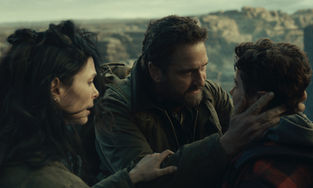'The Kitchen' review: Daniel Kaluuya & Kibwe Tavares' dystopian drama tries to turn the corner with Kane Robinson
- S.J.

- Jan 18, 2024
- 2 min read
Updated: Aug 10, 2024

The rich get richer, the poor get their apartment complexes raided and damaged at regular intervals. Directors Kibwe Tavares and Daniel Kaluuya both make their feature film debuts in that particular role with The Kitchen, a scrappy sci-fi drama set in dystopian streets of London. With social housing or proper safety nets no longer existing, we meet Izi (Kane Robinson) who lives in ''The Kitchen'', which is a neglected neighbourhood and community filled with poor people and shabby apartment buildings. Working at a futuristic garden graveyard where the dead are turned into plants, he meets Benji (Jedaiah Bannerman), a young kid who has now become an orphan due to losing his mom. Having known his mom, Izi begins to look after Benji, mostly in order to keep him out of trouble caused by petty crime gangs that are rebelling against the system.
What is always delightful to see in someone's first feature is the plethora of ideas that they want to see on the big screen and just a sense of genuine joy that you get from creating. That is very much the crux of Tavares and Kaluuya's efforts as the world presented, no matter how many holograms there are, seems both lived in and fully thought out. The directors know how to place and move a camera with cinematographer Wyatt Garfield while Nathan Parker's production design as well as Casey Williams' decor neatly balance the realism of the characters' situation with world-building elements, often meshing well with visual effects. This type of attention to detail invites the viewer in to discuss the film's themes, ranging from social class to police violence or from mentorship in the form of a father-like figure to a sense of belonging.
Izi and Benji themselves explore those themes and emotions by planting small seeds of hope and pride as they hope for improvements. Those seeds are sometimes indeed small because the script by Kaluuya and co-writer Joe Murtagh is very uneven since it lacks the kind of momentum that the visual style has. Robinson and Bannerman do a perfectly okay job of portraying their characters' hopelessness, friction and occasional happiness but the film features long stretches of aimless wandering around the premises with little to no emotional resolution. There is one beautifully crafted roller skate party, which exemplifies what the filmmakers are going for—and again speaks to that pure joy found in Tavares and Kaluuya's direction—but it's a rare moment of heartfelt expression in a movie that needs more of them. These filmmakers should definitely cook more in the future but with finer ingredients.
Smileys: Production design, set decoration
Frowneys: Screenplay
Can you stand the heat?










